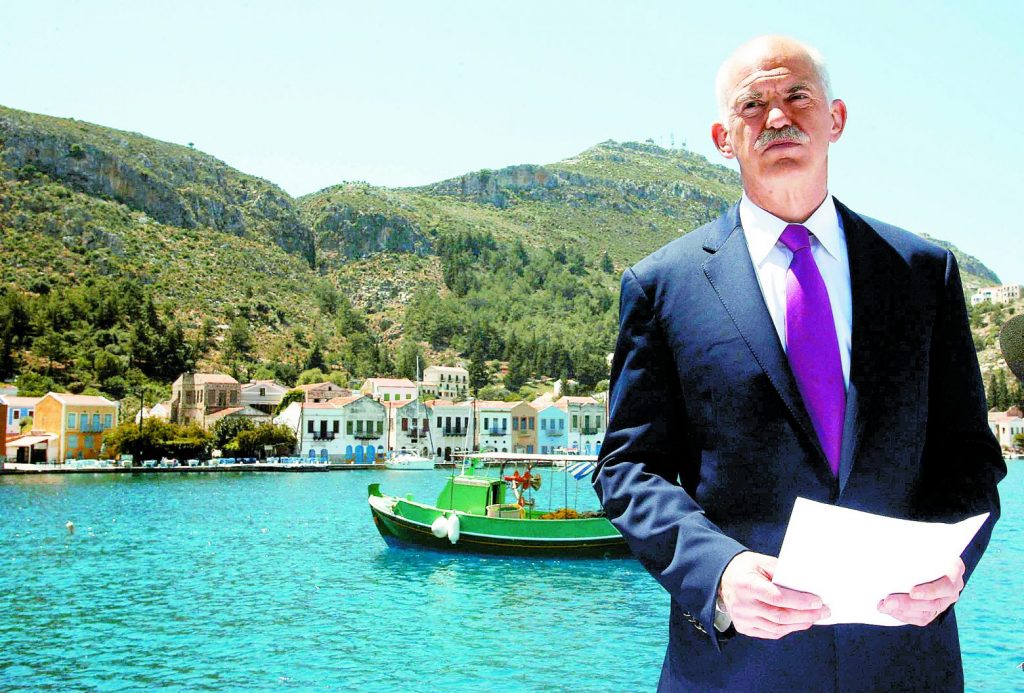
It was a Friday, April 23 and nothing foretold the financial storm coming from the incorrigible Castellorizzo. The prime minister at the time, George Papandreou, on his name day, wore a purple tie in the spirit of the occasion (mournful to many), and in his background the sunny, enchanting harbor of Castellorizos, with its colorful tiles. With houses, fishermen’s boats, he announced to the Greek people in front of the ERT camera a “bad mandate”, which will be the beginning of a difficult decade, a continuous test of our economic, institutional, social, political and above all moral tolerance.. But we were in the Euro.
Mr. Papandreou announced to the Greek people on that day the implementation of an “unprecedented support mechanism” from the sunny, springtime Kastellorizo, which was no more than a first memorandum. The stone years of memories began from that day. Greek people like Schäuble, Merkel, Paul Thomsen (who at one point admitted that “the IMF was permanently wrong in its assessment during a certain seven years”!), Moskovici (whom we later honored in Greece), Dominique Strauss-Kahn (who requested a memorandum in 2009), Nicolas Sarkozy, José Manuel Barroso, Jean-Claude Juncker (perhaps the most reasonable of us), the then distant Christine Lagarde, Joaquin Almunia and other “children” of the economic crisis, every night they come threateningly into our homes, demanding cuts, layoffs, pension cuts and They spread fears of wage cuts. The commemoration brought grief to the country and overthrew democratically elected governments.
George Papandreou said on April 23, 2020, “It is a national and imperative need to officially ask our partners to implement the support mechanism. I have already ordered the finance minister to take the necessary steps. We are on a difficult path, a new “odyssey” for Hellenism.”
However, George Papandreou’s prediction that “we know the way to Ithaca” and “I am sure we will win” was not confirmed, at least in the following years.
In essence, the preparation for the presentation of the memorandum began a day earlier, on Thursday, April 22. Mr. Papandreou, in an attempt to save the country from total unemployment and absolute poverty, takes the initiative and convenes an informal ministerial committee on privatization issues. In fact, the then prime minister wanted to know the intentions of the members of the government regarding the submission of the application for immediate implementation of the support mechanism. After a four-hour meeting of the Cabinet, he received the “green light” and began evaluating the relevant letter.
The truth is that he had planned a trip to Castellorizo for a long time, certainly not to announce a support mechanism, but rather to address issues of regional development. But when he decided to ask for the help of a support mechanism, namely to enter the country memoirs, his colleagues told him to cancel the trip: “Why should we cancel it? Life goes on,” he replied to colleagues. “I preach from Castellorizzo.”
In his message, the then prime minister spoke of a Greece that was “a sinking ship” and “a country without value”. from the government of Costas Karamanlis (among other things, a larger deficit than calculated). From there the story goes like this:
The harsh measures of the first memorandum, enormous popular anger, strikes, demonstrations, “up and down” in the constitution, longing for fascism, abandonment and finally the fall of the Papandreou government and the replacement of Loukas Papadimos. 2011.
After the 2012 dual elections, the Samara-Venizelos government brought in a second index, whereby unemployment accumulated to 25%, while unemployment rose to 27%. However, debt relief was also negotiated. Mr. Representatives of the troika agreed to reduce the deficit to 8% – instead of the 7.4% predicted at the beginning of the year.
But let’s not forget the failure of the first Syriza government’s negotiations in 2015, which culminated in a third (and to many unnecessary) memorandum in the summer of 2015. Then the banks closed, the queues in front of the ATMs, the dire situation families found themselves in, the high taxation and all this to keep the country in the euro. The 17-hour talks ended, it was said at the time, on a difficult note, with the Syriza-Anel memorandum, however, voted for by all pro-European forces in the opposition. A country in the euro, when the SYRIZA parliamentary group votes more than 1/3. But the Greek economy has taken a heavy toll.
In August 2018, Greece was freed from the memoranda of understanding, but at a high price.

. “Professional creator. Subtly charming web advocate. Unapologetic problem solver. Devoted student.”





More Stories
Criminal gang in Mykonos encouraged women into prostitution – how they set up romantic dates
Earthquake in Kavtos: “Too early to decide if it’s significant” – Valleys closed, risk of landslides
Halkidiki – Luna Park: SKAI Revelation – Discovered by the Expert